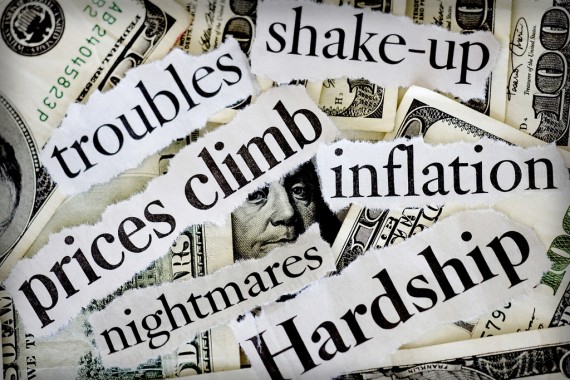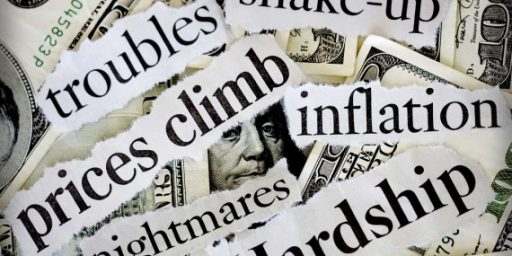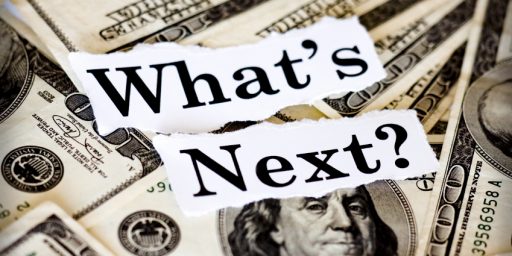Slow Economic Growth: The New Normal?
Another round of GDP growth figures are out, and they show that the U.S. economy continues to grow far slower than necessary to sustain job growth. Is this a temporary problem, or something we can expect to live with for the foreseeable future?
The first round numbers on economic growth in the 3rd Quarter aren’t any more encouraging than any of the other economic statistics we’ve been seeing lately:
The United States economy grew at an annual rate of 2 percent in the third quarter, the Commerce Department reported Friday, as it struggles to gain any momentum for a sustained recovery.
That estimate matched the consensus forecasts for the gross domestic product, and is a slight uptick from the second quarter.
Though the recovery officially began in June 2009, growth since has been tepid, at best. The economy expanded at a 1.7 percent pace in the second quarter, down sharply from 3.7 percent in the first.
Demand, seen as crucial to re-igniting the American economy, appeared flaccid in the third quarter, although there were, here and there, hints of increased consumer spending. Income growth adjusted for inflation and taxes slowed noticeably, rising 0.5 percent in the July-September period after increasing 4.4 percent in the second quarter. And at the other end, prices excluding food and energy increased 0.6 percent, compared with 0.8 percent in the second quarter.
In recent weeks, the economy has presented two faces, which is reflected in the latest G.D.P. numbers. There have been fledgling signs of growth: home sales and chain store sales are up bit, a swelling stock market has raised consumer confidence a few notches, and jobless claims fell noticeably last week, albeit to a still high and painful level.
At the same time, the steroidal effect of the stimulus spending is fading. City and state governments have shed tens of thousands of employees, and states face a sea of red ink as they look at next year’s budgets.
An economy growing at a sluggish 2 percent rate, most economists agree, cannot produce nearly the demand needed to bring down the nation’s painfully high 9.6 percent unemployment rate. The economy needs to produce 130,000 to 150,000 jobs a month just to keep pace with population growth, a number it has not hit in many months.
(…)
It is important to note that Friday’s number is a Commerce Department estimate based on a reading of many sectors of the economy, and that the final number may be revised substantially higher or lower. In the second quarter, the surprise was to the downside: the initial G.D.P. report had placed the growth rate at 2.4 percent, and it subsequently wheeled down to an annual rate of 1.7 percent.
So, it’s entirely probable that this 2% figure will eventually revised downward and that we’ll learn that economic growth was actually somewhere closer to 1.5%, which is obviously not sufficient to grow the economy enough to replace the jobs that have been lost since 2008.
So that leaves us with the obvious question of when the economy will return to the growth rates that Americans are used to, or if it ever will. As Dave Schuler noted over at his own site several weeks ago, there is a distinct possibility that the United States is entering an era where our economic growth will make the 1-2% of Europe, rather than the 4-5% that we’ve become used to in the post World War II era:
[T]he experience in growth over the last twenty years shows a markedly slower rate than prevailed over the previous twenty years or the previous forty years.
Second, the period since 1990 has included two bubbles: the dot-com bubble and the real estate bubble. Those bubbles are clearly evident in the peaks over the last twenty years.
(…)
What forces could lead to growth at the 4% or higher level? Besides the unexpected which is just that, unexpected, I can only think of two. If you believe that we’re going to experience growth at a level higher than that of other developed countries you must either believe that we’re going to continue to experience a high level of immigration and/or that we’re going to continue to experience bubbles
As to the first, it’s worth noting that we seem to be entering another era in American politics where anti-immigrant sentiment is on the rise. If anything, I would expect U.S. immigration laws to become more restrictive in an era of slow economic growth, even though that has the ironic effect of itself contributing to the lack of economic growth. As to the second, we are learning today what the consequences of an economic bubble actually is. Yes, they lead to a few years of spectacular growth, and many people get rich quick. In the end, though, the artificial diversion of resources that an economic bubble represents will end up being corrected when the bubble collapses and takes the economy down with it. Creating economic bubbles isn’t all that hard, of course. All it takes is an incredibly loose monetary policy at the Federal Reserve. What happens thereafter, though, makes whatever benefits the bubble provides not worth the cost.
Let’s assume, then, that the overall conclusion is true and that the U.S. is headed for an era when our long-term economic growth is in 1-3% range. Economically, that would mean that the “natural” unemployment rate would end up being higher than the 5% that we’ve been taught to accept for so long. Culturally, it may mean that American optimism is a thing of the past. And, politically, the consequences are unknowable but it seems clear to me that American politics in such a world would be far more contentious and radicalized.
There’s a reason that politics in the 1950s gave us men like Eisenhower and Stevenson, and there’s a reason what politics in 2010s are giving us Sarah Palin, Glenn Beck, Alan Grayson, and the 24/7/365 cable “news” culture, and I would submit that much of it is related to the fact that people are beginning to believe that they are going to have to fight over pieces of a pie that isn’t going to grow nearly fast enough to sustain the standard of living we’ve become used to.





I think most of it is recency bias:
This isn’t to say that the “recent’ can’t be the start of a “new normal,” but chances are we are over-sensitive to the suggestion.
Interesting that people are foreseeing European growth just was we adopt foolish European social policies. Correlation? Let’s hope we don’t adopt the European habit of similar to US downturns but much small upturns. But I guess the elite will be happy that we’re more like Europe now.
Of course, the real problem is trying to forecast with only the experience of the current failed Democrat administration. I remember another time when slow growth, death of the American dream was all the rage, then Reagan was elected and the country experienced a new morning. New hope and a whole new way of life was permitted to bloom (IT, there but strangled by government policies).
So we’ll have to see if the conditions persist after a significant change in political elites. We may see change and feel hope with a dumping of the Dem congress or we may have to wait for a change in the White House. But until Republicans fail as miserably as the Democrats, we won’t know if this is the new norm.
Its only the new normal if we go deeper down the Keynsean Social-Democracy rabbit hole
If you follow the link to Dave’s page, something interesting happened around 1980. We can’t really say that is when we adopted foolish European social policies, can we? Reagan the socialist?
(I think our very low, mid-recession, growth rates give us that “recency bias.” The thing that’s interesting about Dave’s graph is that the high spikes, the periods of very high growth contributing to a high average, disappear around 1980. We talk there about various factors. I don’t deny Steve V’s contribution that monetary policy was a factor, but so must other things be, like energy prices.)
JKB,
You didn’t have a globalized economy when Reagan was president. If republicans had answers, I have not heard of them yet.
Well I’m sure if the price of oil collapses to 20% of the current price tomorrow, the economy will pick up (like it did early in the Reagan administration).
The link between GDP growth and unemployment numbers is not an exact one.
During these “slow” economic times American corporation have squirreled away over $1 trillion dollars that could have gone to creating jobs.
A simple one-time tax on corporate cash reserves would probably spur quite a rise in employment.
> Interesting that people are foreseeing European growth
European growth looks somewhat better than the cliff the GOP was taking us off of in ’08.
Well, I wasn’t commenting on the level of GDP under Reagan. My point was with all this, “this is it and it isn’t getting better” has been done before. Carter was the hope after republicans had failed miserably for the first half of the decade (ignore Watergate to see the real failure), but he turned out to be far worse with a lack of vision and a willingness to see America decline. Reagan ran on hope and change and actually produced.
So when I see comments about there is nothing but to fight over the scraps, I remember that in my formative years that was the prevailing thoughts as well, but all it took was someone to envision a shining city on a hill to put paid to the small minded. I would be very surprised if that person who re-inspired America was a Democrat, at least in the historical sense.
I do worry that being hobbled with Obamacare and other socialist policies, the American thoroughbred might be physically limited to giving pony rides in the future even if the gates is opened and she has room to run.
“over $1 trillion dollars that could have gone to creating jobs.”
Jobs to do what? Build things no one wants to buy? Jobs are created to produce items expected to be in demand in the near and far future. They are also more readily created if it is easier to shed them if the projections are wrong.
Also, you don’t really believe that “cash reserves” means that the money is actually in cash, do you? Your one-time (yeah right) tax would crash the stock and bond markets, drain away all the cash keeping government borrowing costs down and wick away anything left to locations beyond US government theft.
I don’t know if Reagan did much. He allowed the fed (Paul Volcker) do his job. I do admit you need someone with a voice to inspire our country and Obama seems to be uninspiring. Today, I see the fed wanting to print more money and the republicans with more tax cuts. And, I too ask, is that it?
“Jobs are created to produce items expected to be in demand in the near and far future.”
U.S. GDP – composition by sector:
agriculture: 1.2%
industry: 21.9%
services: 76.9%
Every single store I partonize these days seems to be chronically understaffed.
Any store that doesn’t expect to waste my time waiting to give them my money will earn my business…ditto any firm that employs English-speaking humans to staff their customer support departments.
You might want to try holding your breath and stomping your feet on the ground, too, ponce.
Drew,
America isn’t the old Soviet Union.
Any store that expects me to sacrifice my time so they can pocket a few extra bucks by running a skeleton staff will lose my business.
Pretty simple.
I think it’s also important to recognize that the BEA has been revising its estimates of GDP downwards systematically for the last couple of years. Expect the 3rd quarter 2010 to be revised downwards. That will put the annualized growth below 2%.
During Bush’s final quarter in office the U.S. GDP “grew” at an annual rate of…-6.4%.
Good Times.
I’d like to see the empirical evidence that raising taxes on corporations increases factor utilization.
It is a truism that someone has to bear the burden of any tax that is levied. However, various actors in the economy will attempt to shift that burden away from themselves. Theoretically the burden of a corporate income tax can be borne by either capital (i.e. shareholders) or by labor or even both. Empirically the results indicate that last one is probably the truth, that the burden of a tax is shared between capital and labor.
So that simple tax will likely have two effects, neither of them good:
1. Reduce capital investment.
2. Reduce labor/wages.
Not exactly the recipe for promoting strong economic growth.
In 2008, we lost an average of 317,250 private sector jobs per month. In 2010, we have gained an average of 95,888 private sector jobs per month. That’s a difference of nearly five million jobs between Bush’s last year in office and President Obama’s second year.
http://www.bls.gov/data/#employment
On Bush’s final day in office, the Dow, NASDAQ, and S&P 500 closed at 7,949, 1,440, and 805, respectively. Today, as of 10:15AM Pacific, they are at 11,108, 2,512, and 1,183. That means since President Obama took office, the Dow, NASDAQ, and S&P 500 have increased 40%, 74%, and 47%, respectively.
“So that simple tax will likely have two effects, neither of them good:”
Not if you exempt corporation that hire enough new workers from a tax on their cash hordes.
You can pay the government or you can pay new workers…
There are valid reasons for having cash reserves. For example, with the recent financial crisis many firms increased their cash reserves as a result. So you’d be setting up a situation where during the next financial crisis, and there will be one eventually, firms would be in a weakened position to deal with it.
Further, it isn’t clear that firms would spend the cash reserve on hiring new workers. They might spend it in other ways such as on capital. Capital and labor have some degree of substitution depending on the industry and the underlying production processes.
The overall impact on employment is at best speculative.